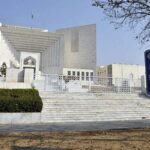NEW YORK, Feb 17 (APP):Life in curfew-bound Indian Occupied Kashmir has been “on hold” in the last months since New Delhi annexed the disputed state, bringing in troops, shutting down phone and internet services and detaining hundreds of people, according to a report published in The Wall Street Journal (WSJ).
The newspaper’s correspondents — Vibhuti Agarwal and Vivek Singh — reported from Srinagar that there was ‘little sign of life’ at the shuttered offices of the two main political parties — the National Conference and Its longtime rival, the Peoples Democratic Party.
“The old mainstream has been choked off,” Abdul Hameed Kosheen, a Peoples Democratic Party leader who was not detained,” was quoted as saying in the dispatch.
“Kashmir is in a political freeze,” he added.
The journal said no date has been fixed for local elections, promised by Indian Prime Minister Narendra Modi, to bring in new political leaders who are not focused on independence of Kashmir. At the same time, politicians in Jammu and Kashmir say that India’s clampdown will backfire, according to the report.
Kashmiris “feel insulted and humiliated, hurt and pained. They have been denuded of their identity,” Hasnain Masoodi, a National Conference politician from Srinagar and member of India’s Parliament was quoted as saying. Delaying the release of political leaders “will make things worse. It will provide no solution,” he said.
Hundreds remain in detention, including activists, businessmen and lawyers, the Journal said, citing India’s Home Ministry. Shops selling essential items open for a few hours a day. Tourism, the mainstay of the region, is down to a trickle.
“The Hindu nationalist base of Modi’s Bharatiya Janata Party has long sought to firm up New Delhi’s claim to the region by eliminating Kashmir’s unique semi autonomous status, a move they argue would help spur growth and development,” the dispatch said.
Among the thousands arrested are top Kashmiri leaders — Mehbooba Mufti of the Peoples Democratic Party and Omar Abdullah of the National Conference — who had worked closely with the central government during terms as occupied Jammu and Kashmir’s chief minister.
While they often campaigned for more independence for the state and Ms. Mufti’s party advocated self-rule, both publicly supported being a part of India, the dispatch said, pointing out that both are being held under a law that allows for detention without trial for up to two years.
“The two regional parties provided a moderate alternative to the separatist movement for the 12.5 million residents of Jammu and Kashmir,” it said.
Modi told Parliament last week that the two political leaders pose a threat to stability. “Mehbooba Mufti said Kashmir made a mistake by joining India—are you justifying such speech?” he said. Abdullah’s father, Farooq, “said if (Kashmir’s autonomy) is removed no one will unfurl the national flag in Kashmir. Can we agree with them?” Mr. Modi said.
According to the Journal, the prime minister’s office declined to answer questions about the impact of the detentions. A handful of local leaders have been released from detention but are generally keeping a low profile, it was pointed out. Some said that to gain their release they had to promise they wouldn’t be involved in protests, according to the dispatch.
Organizers from both parties said they would stage rallies to protest New Delhi’s decision to strip the region of its special status once the government allows them, the journal said.Ms. Mufti’s daughter, Iltija Mufti, has been using her mother’s Twitter account to criticize the government. “Question is how much longer will we act as bystanders as they desecrate what this nation stands for?” she tweeted.
Modi may have miscalculated the pushback, the newspaper said, citing both political parties. Protests across the country over a new citizenship law that critics say discriminates against Muslims show citizens are worried about how his policies affect minority groups and democracy, they said. Modi made a risky bet that Kashmir’s political landscape can be rebuilt without its traditional leadership, particularly as local resentment grows, it said, citing local leaders and analysts.
“Without the involvement of local leadership and the local Kashmiri population, it seems unlikely that the future of Kashmir can be resolved,” Namrata Goswami, senior analyst at the New Delhi-based Institute for Defense Studies and Analyses, was quoted as saying in report.
The Indian government suggests that new leaders who accept the new status quo, rather than violent separatists, will fill the political vacuum, the dispatch pointed out and named Altaf Bukhari, a businessman, former state finance minister as one such politician.
Bukhari, it said, led a group of Kashmiris to meet with central government representatives with demands that included protecting native residents’ land and jobs and releasing detainees. “Importantly, the group didn’t request the return of Kashmir’s semi autonomy,” the dispatch pointed out.
The crackdown in Kashmir has cost the region about 200 billion rupees ($2.8 billion), the Kashmir Chamber of Commerce and Industry estimated. The chamber said 496,000 jobs had been lost in Kashmir, a region of seven million people, since August.
“Everyone is struggling: mentally, physically, financially and politically,” Kaiser Yusuf who owns a fabric shop in Srinagar was quoted as saying. “We can’t live like this forever. The solution lies in discussion.” Others say the pressure to push back is growing and could ruin chances of stability in the region for years.
“Local leaders who have long fought each other for control of the state will emerge from detention united against New Delhi, said Shehryar Khanum, the daughter of a detained leader of the Peoples Democratic Party, who has spoken to her father and other detainees.“They will come out and speak, in one voice,” she said.
Meanwhile, Associated Press (of America), which focused on the communications situation in occupied Kashmir, says that popular social media platforms such as Facebook, WhatsApp and Twitter remain blocked. And while users can access YouTube and Netflix, the internet service is too slow to stream video.
Some Kashmiris are evading censors by using virtual private networks, or VPNs, which are widely employed globally to access restricted websites, but Indian authorities are looking for ways to clamp down on those, too, AP said.
“Frankly, let’s call it what it is: It’s still an internet shutdown and a blanket censorship of the internet,” Nikhil Pahwa, a New Delhi-based digital rights activist, was quoted as saying by the news agency. “Can you imagine this being done to Delhi?”
The portion of the divided Kashmir region that India controls was already one of the most militarized places in the world before the government scrapped its semi-autonomy and statehood last summer.
The government said it was necessary to ban the internet to head off anti-India protests by rebels who have fought for decades for independence Since Modi came into power in 2014, the internet has been suspended more than 365 times in India, according to the global digital rights group Access Now.In January, government official Shaleen Kabra said terror groups operating in the region and anti-national elements were using the internet to “propagate terrorism” and spread rumours to “cause disaffection and discontent.”
Recently, internet service was suspended in areas of New Delhi, in the eastern state of West Bengal, the northern city of Aligarh and the entire state of Assam during protests after the contentious citizenship law was passed in Parliament.
In occupied Kashmir, internet bans have been more frequent, AP said. More than a third of India’s internet bans of the last six years have imposed there, some lasting months.
In 2017, Indian authorities blocked 22 social media sites, including Facebook and Twitter, and cut 3G and 4G mobile data services for one month in the region in an effort to calm tensions after protests fueled by videos depicting the alleged abuse of Kashmiris by Indian forces. United Nations experts at the time said the ban had “the character of collective punishment.”
On Wednesday, four U.S. senators wrote to U.S. Secretary of State Mike Pompeo, expressing concern about the curbs on the internet in Kashmir and calling for its full restoration. President Donald Trump is to visit India later this month.
For Kashmiris, the internet shutdowns are more than an inconvenience. They have a grave human cost, the agency said.
During the service blackouts, critically ill patients can’t access government healthcare or seek insurance reimbursements online, students can’t apply for fellowships or take competitive exams and distraught families can’t connect to relatives outside the region, the US news agency said.
A successful telemedicine consultancy operated by a group of Kashmiri doctors who shared thousands of patients’ medical reports with a pool of doctors in the U.S. and Europe for their opinions on treatment had to close down.
The internet lockdown also hurt Kashmir’s economy as tens of thousands of artisans became jobless when their handicrafts couldn’t be sold online. Local tech companies had to close or relocate to other areas of India, suffering heavy losses. As Kashmiris rush back online, authorities have instructed commercial broadband operators to block VPNs.
One official of state-run Bharat Sanchar Nigam Ltd., the leading broadband service provider in Kashmir, said it’s proving difficult because of the proliferation of new digital workarounds.
“We’ve little expertise to keep track of countless applications added to the digital world every day,” said the official, who spoke on condition of anonymity because he was not authorized to talk to media. He said authorities have privately said they won’t restore regular internet broadband service until VPNs can be blocked.
Officials at the region’s police, home and telecommunications departments said they wouldn’t comment. In a government order on Jan. 31, Kabra said authorities reviewing internet activity after the blackout was partially lifted found VPNs were being used “for coordination of terror acts, transmission of rumours and targeted messages to spread ideologies inimical to the interest of the state.”
Analysts say the clampdown could spearhead a new level of government control over information allowing it to crack down on freedoms in Kashmir and elsewhere in India.
“Given that this is a norm that has been established: that it is legal for the state to ask internet service providers to start filtering out most of the internet, nothing stops the government of India from doing something similar. There’s no accountability, no transparency,” said Pahwa, the digital rights activist.





